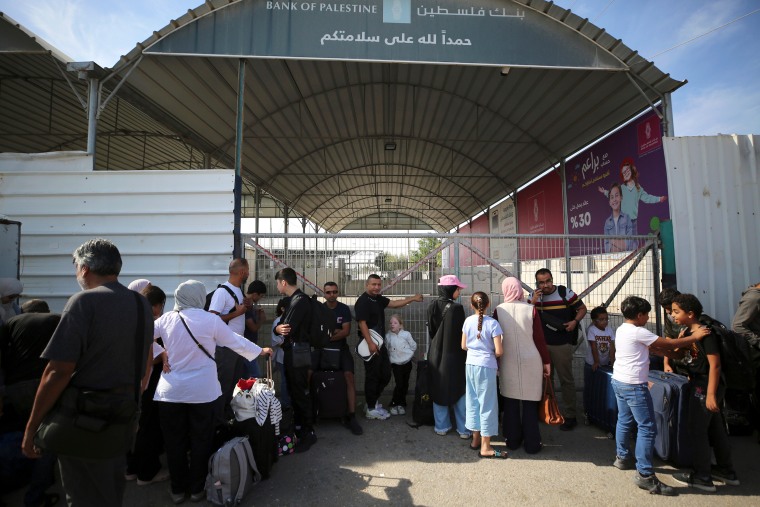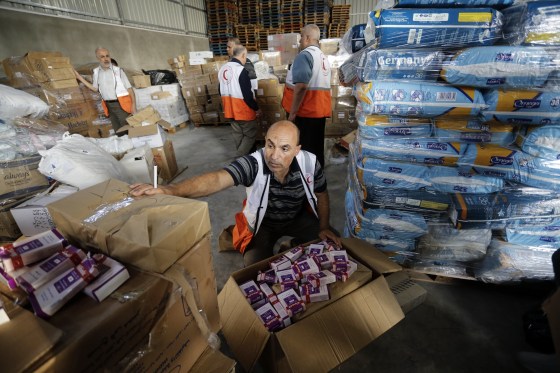The Rafah border crossing is the only land route out of Gaza not controlled by the Israeli government, and when there is no fighting it is rarely more than an hour’s drive from most places in the Palestinian territory.
But for Palestinian Americans who have been trapped in Gaza for nearly three weeks and are desperate to escape the escalating war between Israel and Hamas, it feels a million miles away.
Israeli missile attacks — launched in retaliation for the Oct. 7 Hamas terrorist attack that killed more than 1,400 — have made getting around treacherous. Many of the roads have become impassable. And with gas supplies dwindling, finding a way to the border is increasingly difficult and expensive.
“Taxi fare used to be around $20, but now it jumped to around $150 — that is for those who can find a taxi that still has fuel,” said Maha Elbanna, a U.S. citizen who lived in New Jersey for a dozen years before she returned to Gaza 15 years ago to work for an aid organization.

The trapped Palestinian Americans say nobody seems to know when they will be allowed to enter Egypt through the Rafah crossing, which was shut down after Hamas launched the deadly attack and in response Israel instituted a full siege.
Those waiting in limbo as bombs fall describe living on water, bread and hummus, although it's becoming increasingly difficult to find drinking water.
Jason Shawa, a Palestinian American who works as a translator, is stuck in central Gaza with his wife and two daughters. They're living in a cabin with about 57 people, including 22 children, and everyone is "extremely drained and exhausted," he said.
Their generator recently broke, and they had to haul it to a mechanic on a donkey cart. After the repairs, it's "barely functioning," he said.
They have three light bulbs that they turn on at night using power from a small solar panel system that provides "minimal electricity."
One bulb lights the patio where people sleep outside, another a room where all the children sleep and the third a room for the elderly.
As for internet service, it's undependable, he said
"Internet has become a major concern now," Shawa said. "The internet provider sent us a message yesterday morning that they will stop providing internet within 48 hours due to the lack of diesel fuel, which is needed for generators to keep the system going.”
They charge their phones with whatever electricity remains from solar power, but "we virtually have no cellular connection."
"You have to try dozens of times, dialing and redialing,” he said. “You get 10 to 20 seconds speech on the phone, then it cuts and then you have to try again.”
As the situation spirals, there's little sign a diplomatic impasse that's keeping Palestinian Americans from passing through Rafah into Egypt will be resolved immediately.
Four hundred U.S. citizens and permanent residents and 400 more of their dependents have requested help from the State Department to leave Gaza through the Rafah border, a source familiar with the situation on the ground told NBC News.
“It is our very sincere hope that they would be able to leave in the coming days,” State Department spokesperson Matt Miller told reporters Tuesday.
Lynn Hastings, a Canadian who is the United Nations’ resident coordinator for the occupied Palestinian territory, said the Americans stuck in Gaza have little choice.
Nabil Alshurafa, a Palestinian American who lives in Chicago, said his mother, Naela, was visiting family in Gaza when the fighting erupted and has tried and failed to cross the border four times, twice before the State Department starting sending out guidance.
During her second attempt on Oct. 10, Alshurafa said, chaos erupted amid shelling near the Rafah crossing. He said the bus she was on pulled over and the passengers were ordered to get out.
Alshurafa said the guides who had been hired to escort them over the border panicked and tossed the passports they’d collected back at the passengers.
“It’s so chaotic,” Alshurafa said. “Everyone’s trying, crying, trying to get out. And there’s this guy just grabbing passports and just literally throwing it out. Like, throwing it at people.”

Abood Okal, who lives in Medway, Massachusetts, and is stranded in Gaza with his wife and their 1-year-old son, said in a voice memo Wednesday that they are staying just 10 minutes away from the Egyptian border.
Now, Okal said, they have run out of milk for their son, Yousef, and “airstrikes have intensified in the last few days.”
"It would be his first night ever in his entire life to go to sleep without having milk" Okal said.
Yousef has already had trouble sleeping, his father said.
"We’ve been trying to soothe him as much as we can and keep him shielded from the wrath of the war," Okal said. "And we’d like to think that we’re continuing to do that successfully."
Dr. Barbara Zind, a Colorado pediatrician who has been working in Gaza, agreed that conditions for the would-be escapees clustered near the Rafah crossing are deteriorating rapidly.
“I am comfortable at a U.N. facility in the south with about 40 other people working for humanitarian aid programs,” Zind said in a text message.
She said about 16,000 Palestinians are also taking shelter at the facility.
“There are probably over 400 people per toilet,” Zind texted. “They get 1 pita and ¼ can of canned meat per person per day.”
Fares Abu Fares, a volunteer with a Palestinian children’s relief fund, whose wife and children are in the U.S., said he considered getting out of Gaza.
But Wednesday, Fares said, there were explosions in the Gaza neighborhood where the rest of his extended family lives. Now he's mad.
"They just hit us by about six, seven bombs," Fares said, sounding out of breath. "My whole house was shaking. I have debris all over my hands."
"I've decided I'm not leaving," he said.
Other Palestinian Americans are also sitting tight while looking for alternative ways to get to the Rafah border when it opens.
Fady Isleem, a Palestinian American from Columbus, Ohio, whose mother is trapped there and is staying a 40-minute drive from Rafah, said that one of his uncles owns a car that could get them to the crossing but that it runs on diesel fuel that is now impossible to find.
“He told me this morning he’s going to try to use the vegetable oil,” Isleem said.




